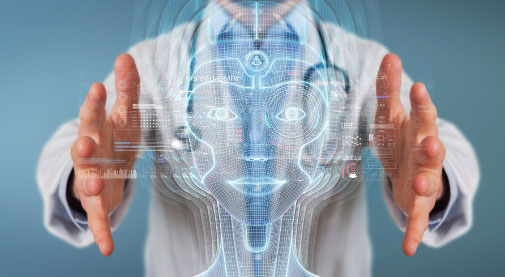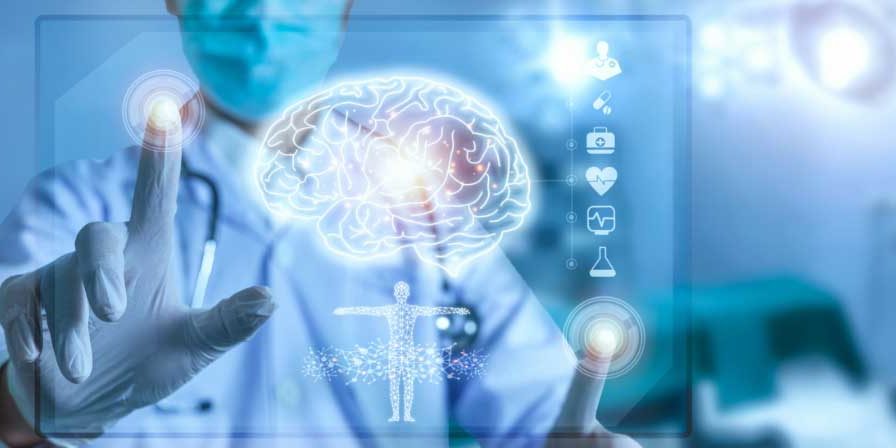“According to Accenture, the growth in the AI healthcare space is estimated to touch $6.6 billion by 2021 with a CAGR of 40%.
Artificial Intelligence and Machine Learning are well and indeed poised to make healthcare providers’ jobs more relevant & streamlined than repetitive. The technology improves personalized healthcare services while significantly decreasing the time needed to look for vital information to make decisions and better patient care.
Artificial Intelligence in Healthcare has tremendous possibility to increase costs, the quality of services, and the way. Here’s how –
Medical Imaging Diagnostics
From machine-driven workflows to enhancing processing speed and image quality, medical imaging developers create various techniques to use AI in Healthcare for identifying and diagnosing diseases.
For a long period, top-grade imaging can look stiff on the outside, and it saves a vast amount of capital spent on hospital stays.
While top-grade imaging can look expensive on the outside, it saves a vast amount of capital spent on hospital stays in the long run. It avoids the more valuable, invasive disorder treatment that would be needed if the disease was discovered towards a later stage.
Advancements in medical imaging have primarily contributed to enhanced screenings accuracy for disease, helping in initial diagnoses. Without this progress, it would be difficult to diagnose these diseases until they entered a more life-threatening stage where signs become apparent. With the arrival of molecular imaging, the disease can now be identified immediately at the cellular stage. This leads to more precise treatment and far safer patient consequences.
Virtual Health Assistants
Researchers develop AI-driven virtual assistants for the Healthcare industry. Improved ways to intelligent devices, advanced technology, customer expectations, the development of value-based care, and growing state and national policies are all pushing virtual health choices in the United States promptly.
Data is rising that virtual health assistance can improve results in particular populations by reducing the extent of hospital stays, reducing readmission rates, and enhancing the activity among chronically ill patients. The blend of AI with Healthcare wearables is a great one that helps streamline telemedicine and lets the healthcare provider focus on delivering better service and care.
AI-Powered Chatbots
For the healthcare industry, AI-driven chatbots can make a world of difference. Juniper Research’s report states that “By 2022 chatbots will be liable for saving $8 billion per annum of costs for Retail, e-Commerce, Banking, and Healthcare. As query analysis, beats get overcome, and the primary interaction is automatic, the healthcare sector can require substantial cost savings via chatbots.
AI-powered bots can assist doctors in healthcare analysis by a range of problems. Users choose their results from a predefined collection of options and then suggest a course of action. The likewise research also forecasts that the benefit of chatbot communications where no human interruptions occur will rise to 75% in 2022 from 12% in 2017.
Knowledge management systems will display a crucial role of chatbots for AI. The basic questions and answers would be collected during a solution’s life, serving in the chatbot’s training method.
Proactive Medical Care

In traditional medical practice, operating the patient after the disease has been discovered was an ongoing trend. For instance, if a patient consults a doctor with particular symptoms, the doctor might carry specific tests and later find the patient has cancer. Therapy like radiation and chemotherapy is commenced later on. Furthermore, if a patient consults a doctor with symptoms of diabetes, the doctor first manages the tests before ordering an insulin injection. This type of therapy is called Reactive medical care.
With Artificial Intelligence a notable transformation has been seen in this trend as reactive medical care suited to proactive preventive care. In the end, the patient’s entire medical records are first studied, after which high-risk markers for various diseases are highlighted. At-risk patients are then seen for any variation in their health. If anything appears dangerous enough, then the application can recommend medical interference.
Summing Up
AI is streamlining the healthcare industry like never before. It is shifting the doctors’ role, just as it is shifting the role of the patient. There most surely are particular challenges that still require addressing. Though the perks exceed them, and AI is here to develop and encourage. It will grow the medical concept — in treatment, diagnosis, disease detection, treatment, and much more.
At Teksun, we know the complexity of the healthcare space, spend time studying the industry, recognize the gaps that survive, and ultimately succeeded in the challenges through efficient and effective IoT-Based Solutions.
To know more about IoT-based healthcare solutions that accommodate your requirements and use cases, get in touch with us.



